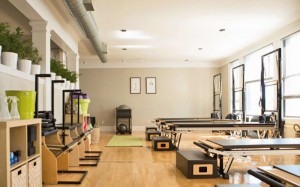I get asked this question a lot when potential clients call my Pilates studio: what’s the difference between mat Pilates and equipment Pilates? There are actually several.

Mat Pilates is More Core Work
I should start off by saying that if you’re asking yourself “What is Pilates?” then read my linked article first.
When you exercise using mat Pilates, you are primarily focusing on your core. Yes, your arms and legs will definitely get a workout, but the majority of the time you’ll be focusing on your abs. If your primary focus is to whittle your waist, then start with the mat.
The other thing to know is that mat work is a smaller part of the entire Pilates repertoire. Using just your body and no props, there are about 50 or so exercises. It’s a great, fast-paced workout and you’ll definitely be challenged, but if you go to a mat class regularly, you’ll start to experience a lot of moves again and again and this might become boring to you. That said, if your instructor is into props such as a fitness circle, therabands, or small hand weights, these can double or triple the diversity of moves for a mat class.
Equipment Pilates is More Specific
There are over 250 moves you can do on a Pilates Reformer and that’s before you start getting into props or some of the newer moves that have been developed over the past few years (the choreography has really exploded in Pilates). This means equipment classes provide about five times the number of exercises as a traditional mat Pilates class. The Reformer is considered the workhorse piece of equipment in Pilates, and if I could only own one piece of exercise equipment, this would be the one I’d choose. Pilates instructors can work with anyone on a Reformer, from a recent car accident victim to a professional athlete. The exercises range from rehab focused and therapeutic to absolutely sweat-dripping, butt-kicking hard!
Mat Pilates has Great Flow
I find that mat Pilates has a better flow to it. I think this is because there are less exercises to choose from, and you transition from move to move smoothly with minimal breaks. Because I know the choreography so well, I can zone out as I focus on my body and I leave a session feeling incredibly relaxed and lengthened. Then I wake up the next day and my abs remind me of the workout they got the day before!
Equipment Pilates tends to be taught in “blocks” of exercises. I’ll teach a series of four to six ab exercises, then a block of four to eight arm exercises, then switch over to eight to twelve leg exercises … you get the idea. Constantly switching up these blocks will keep clients challenged, their bodies guessing at what’s coming next, and their muscles building strength at a quick clip. All my clients appreciate when they can slide on their skinny jeans without even having to suck anything in!
Do You Need to Do Mat Pilates First?
Joe Pilates believed that you needed to learn the mat repertoire before you could go on the equipment. His thought process was people should learn proper form first and then be introduced to the equipment. I have to say I disagree with him. I think this mindset presumes two things: that the client is too stupid to learn good form on equipment (this is ridiculous), and that using the equipment is somehow detrimental to form. I think having the ability to position a client in a certain way on the equipment helps them learn the form more quickly. There are tricks I can use on a Reformer or the Cadillac that I don’t have access to on a mat, and trust me, I use them all the time.
If you have any questions about mat vs. equipment Pilates, please leave them in the comments below and I’ll be happy to answer them. Have you tried one or both types of Pilates? What did you find worked best for your body? I’d love to hear about your experiences. And, yep, I’ve got a Pilates DVD that I’d love for you to check out.
Cheers,
Lisa